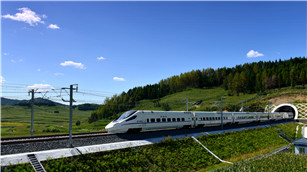Jilin builds up system for aging population
By Wang Zhen
2014-11-15
Jilin province is looking for ways to build a better system to care for its elderly, according to Wang Guimin, deputy director of the Jilin Provincial Civil Affairs Bureau, who made the remark on Thursday, Nov 13.
The UN defines an "aging society" as having 10 percent of the population at the age of 60 or higher. By the end of 2003, Jilin had 4.35 million people in that category, or 15.3 percent of its population, which is 0.4 percent higher than that of the national average. It is estimated that the aging population will reach 6.65 million by the end of 2020. As a result, the province’s inadequate senior-care system poses a big challenge, Wang added. "The government is determined to tackle the problem."
"The short-term goal is to set up a primary care system by 2020 with the highlights of three areas," said the deputy director. "We mainly focus on providing customized home care services for elderly people, and necessary services for those in nursing homes."
The Jilin government put forward a government policy in April aimed at speeding up the development of the senior-care industry by offering favorable policies in terms of government funding, land utility and care worker training.
One new government initiative is to build senior care facilities in the urban area and in new communities. It also has policies to provide incentives for individual and institutional investors to open nursing homes and is encouraging new college grads to enter the care industry, with more financial support to be provided for opening or enlarging nursing homes and a 12,000-yuan subsidy per bed to increase the number and capacity of care institutions to meet the rising demand.
Still, in spite of the government’s efforts, not all seniors express a desire to stay in a nursing home. According to a 2012 survey by Health Times, only 11.3 percent of the elderly in cities surveyed chose nursing homes, while 12.5 percent at the county level did. So the provincial government encourages elderly people to stay at home to receive caring services, and then to rely on community-based care centers or nursing homes.
Chinese tradition calls for young people to take care of their aging parents, but, with the "one-child" policy, many young people find it difficult to provide the care their parents need. In many cases, a couple may have to look after four elderly people.
This has become a serious social problem. Mu Guangzong, a demographics expert at Peking University, sees it this way, "I feel that the government should be the designer and provider of pension services and should promote the professionalization of elderly services."
With a more inclusive senior care network, the government might make it easier for investors to find land for nursing homes, with extra subsidies for those who are disabled or have financial difficulties. But, even with government subsidies, which are crucial, a more comprehensive care network calls for more care providers and professional care workers.
It also calls for smaller hospitals to switch to nursing homes to ensure more professional caretakers providing more high-quality services for elderly people. So, the province plans to train more care workers in the field of elderly care, rehabilitation, nutrition and social services.
According to Wang, the social welfare officer, "Jilin will need 300,000 professionals working in the elderly care industry by 2020."
Jilin has become the fourth province in China to carry out the senior-care related policy following Beijing, Fujian and Sichuan.




